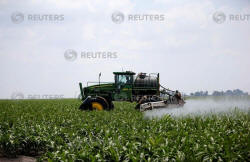Tractor maker Deere aims to ride green revolution in
Africa
 Send a link to a friend
Send a link to a friend
 [November 16, 2018]
By Joe Bavier [November 16, 2018]
By Joe Bavier
JOHANNESBURG (Reuters) - U.S. Deere & Co <DE.N>
expects to see demand for its farm equipment in Africa grow 8 to 10
percent annually in the coming years, driven by expansion in key markets
like Ethiopia and Zimbabwe, a local company executive said.
Farming accounts for around 60 percent of total employment in Africa,
according to the World Bank. In Ethiopia, Malawi, Mozambique, Tanzania,
Uganda and Zambia, food production is projected to add more jobs than
the rest of the economy combined through 2025.
A global policy shift away from food aid toward local production -
championed at the start of the decade by the World Food Programme among
others - has sparked a green revolution, increasing Africa's potential
as a market, said Jacques Taylor, managing director of John Deere Ltd
Sub-Saharan Africa.
"We started to see a commercial market developing for agricultural
commodities ... That gave an incentive for farmers to produce more," he
told Reuters in an interview late on Thursday.

Taylor said around 80 percent of its equipment shipments to Africa
currently go to 10 markets, including South Africa, Zambia, Kenya and
Ghana.
"We see three or four countries with significant upside growth potential
in the medium-term," he said. "We see opportunity in countries like
Angola, Zimbabwe, Ethiopia and obviously Nigeria."
Deere, best known for its John Deere branded tractors, currently ships
its products to local dealers in Africa where its main competitors
include CNH Industrial <CNHI.MI> and Landini.
Deere's dealer in Ethiopia is partnering with the government, in the
midst of reforms, to set up an assembly plant to supply farm machinery
to the market of around 100 million inhabitants.
Zimbabwe is also undergoing of a major transition after long-time
president Robert Mugabe, who was criticized for overseeing disastrous
farm seizures, was ousted last year.
[to top of second column] |

A worker uses a John Deere tractor to spray a field of crops during
a crop-eating armyworm invasion at a farm in Settlers, northern
province of Limpopo, South Africa, February 8, 2017. REUTERS/Siphiwe
Sibeko/File Photo

"We have high hopes for Zimbabwe. It used to be the food basket for southern
Africa. The potential is known," Taylor said. "Zimbabwe could easily recover and
get back to the levels of production they've seen in the past."
In neighboring South Africa, Deere's most important market on the continent,
President Cyril Ramaphosa's ruling African National Congress has made land
redistribution a key issue ahead of 2019 elections.
Ramaphosa has promised the process will not threaten food security or growth,
but the move has nonetheless unnerved some investors.
"We do see it as a growth opportunity for us. There will be new entrants coming
into agriculture," Taylor said. "I think for the sake of the sector and the
economy, it's important for us to get clarity sooner than later."
Deere reported $2.8 billion operating profit from its equipment business last
year, with 39 percent of that coming from its business outside of the United
States and Canada. Sales grew 5 percent last year in those home markets.
The company does not break down sales data further.
(Reporting by Joe Bavier; Editing by Elaine Hardcastle)
[© 2018 Thomson Reuters. All rights
reserved.] Copyright 2018 Reuters. All rights reserved. This material may not be published,
broadcast, rewritten or redistributed.
Thompson Reuters is solely responsible for this content.
 |